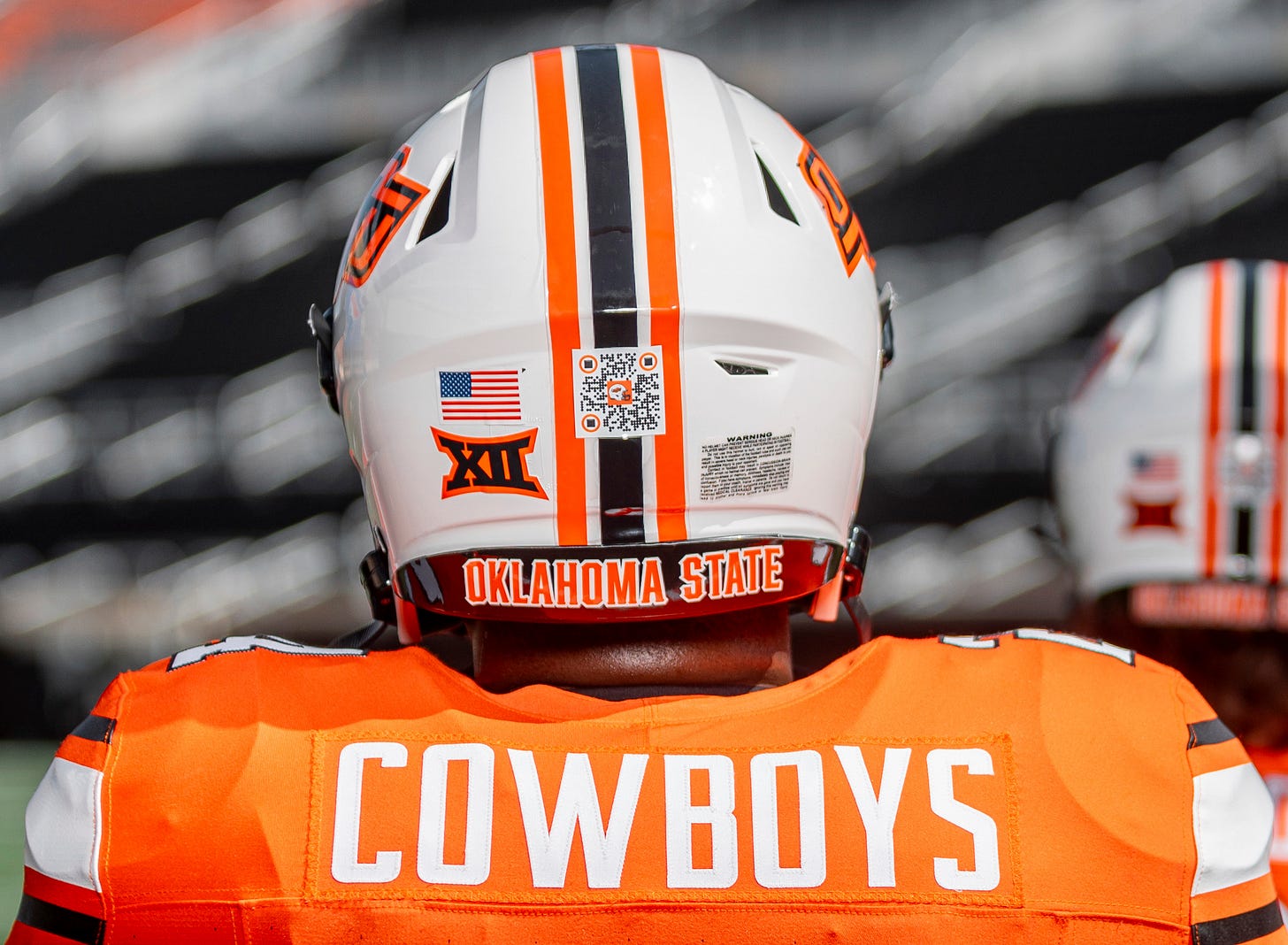Pokes' QR codes on helmets just one idea, but bigger ones are bound to follow

Here’s what I imagine.
It could be Utah State, Boise State or Wyoming. It could be Coastal Carolina, James Madison or Texas State. It could be Bowling Green, Marshall or Tulsa.
One of them, believing it could pull it off because it claims the coolest nickname — Chanticleers in the case of Coastal Carolina — or line up the most famous alumni spokesperson — Randy Moss or Billy Crystal in the case of Marshall — or just represents a cool, solid city — Tulsa — will put together a national advertising campaign, maybe hire the folks who make the GEICO commercials to do it, and charm the masses out of small donations with this kind of a message:
“Are you tired of the SEC ruling the roost, of Alabama, Georgia and Clemson owning the national championship game, of insufferable coaches like Jim Harbaugh and Ryan Day making national championship runs?
“Consider becoming an honorary member of the Thundering Herd and for $20 a month you can help turn college football on its ear.”
Or something far, far, far better that captures the imagination, persuading unaffiliated folks who want to be a part of something.
If politicians can do it with the grass roots, can’t mid-major universities with football programs?
Get a quarter million people to go in on it for a year and you’ve raised $60 million to hand out to football players from a silent majority only wanting to throw wrenches into the system the way masses of small-time GameStop investors crushed hedge fund managers for billions in the market, beating them at their own game.
Impossible?
Maybe not, and maybe not because Oklahoma State introduced something on Tuesday capable of sending athletic programs that direction.
On each helmet worn by each Cowboy this season, a QR code will exist on its back, capable of being scanned by fans watching on television, sending them directly to the donation page of the school’s NIL fund.
Reported Tuesday by ESPN’s Jake Trotter, who once worked in these parts, OSU’s believed to be the first university to unveil such a strategy.
“This is a revolutionary step forward to help keep Oklahoma State football ahead of the game,” coach Mike Gundy said. “It gives a chance for everyday fans across the world to have a real impact when it comes to supporting the NIL efforts for Cowboy football.
“I’m thrilled about this opportunity for our players.”
He’d probably be more thrilled, old school guy that he is, to go back to a time in which name, image and likeness earnings remained off the table for collegiate athletes, or perhaps just back to NIL’s early and innocent salad days, when somebody like Jocelyn Alo might show up in an ad for an Oklahoma City law firm.
Also, Gundy’s no dummy. He can spot opportunity when he sees it and it’s easy to envision how it might work.
Ollie Gordon breaks a bunch of tackles on the way to a long touchdown gallop and when the camera finds him on the sideline, the first thing he does is remove his helmet and turn it around, displaying the code.
Why wouldn’t 500 Poke fans from Perry, Perkins, Tonkowa, Tahlequah, Woodward, Mooreland, Seiling, Gage and Fort Supply, and Oklahoma City, too, decide his 63-yard scamper to be worth a few bucks and more should he do it again?
We complain about college sports, football most of all, resembling the Wild West and occasionally hear folks of great responsibility, commissioners of big-time conferences, for example, talking a future in which it’s addressed.
• The transfer portal can’t be eradicated, but should be open less of the time.
• NIL earnings can’t be done away with, but they can be regulated and limited.
• Salary caps exist in professional sports, why not the colleges?
It all makes sense, but don’t expect the NCAA to come to the rescue. As an enforcer of rules, it’s all but irrelevant and has college football to thank for it.
It would have to be the conferences, which are composed of athletic departments, which are composed of athletic programs, some with greater imaginations than others, fueling larger NIL war chests than others, rendering little motivation to put everybody on the same page.
Now it’s QR codes on helmets, tomorrow it could be a non-major university with cool uniforms, an exciting offense and a way to monetize their NIL collectives in ways previously unconsidered.
The rich may get richer but others might eclipse them, nonetheless.
Come help us turn the world upside down can be an attractive proposition.

